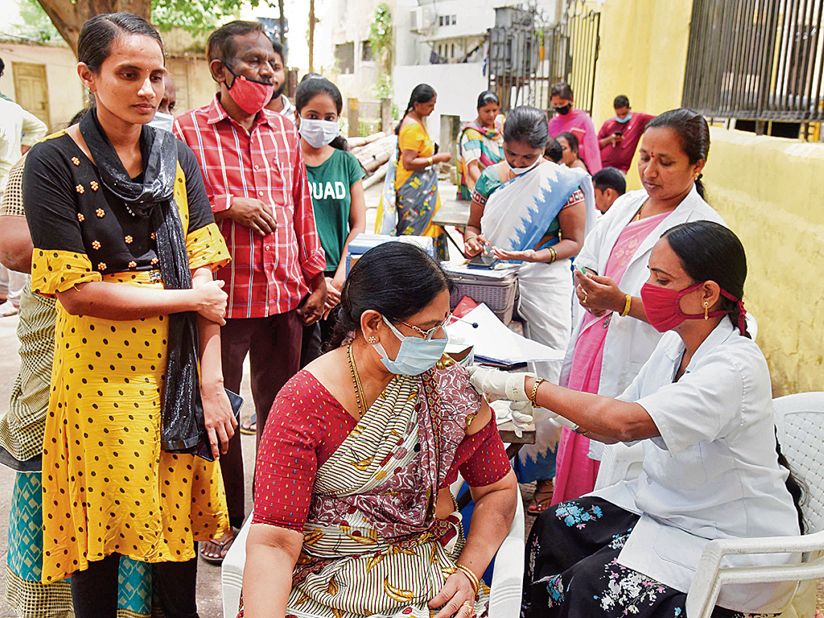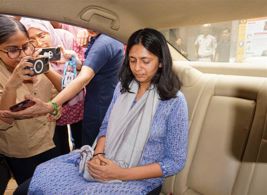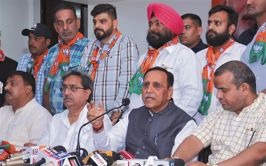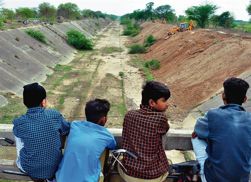
PRECAUTION: Vaccines have been found to be the most effective way of preventing severe symptoms and serious infection. PTI
KK Talwar
Former Director, PGIMER
JUST as we began to feel that the Covid pandemic is over, the resurgence of cases in China has shaken our confidence. The number of cases is rising rapidly in Beijing, including some requiring hospitalisation. According to reports, China is facing a severe shortage of hospital beds and equipment needed to treat patients.
Around 1 million deaths have been projected in China through 2023. Japan, South Korea, the US and France are also witnessing an increase in the number of Covid cases.
There is a steady rise in the number of cases globally — an average of 59,000 cases daily. The precise reason for such a resurgence, in spite of China’s zero-Covid strategy of tracking and isolating every infection, is yet unknown. Various causes are being speculated, including inadequate vaccination coverage among the elderly population and the absence of disease-acquired ‘herd immunity’. The variant considered responsible for the surge in China is BF.7 (a sub-lineage of BA.5 Omicron).
India has survived the comparatively milder Omicron variant, which was quite widespread. This raises the possibility of a higher level of ‘herd immunity’ for protection against another Omicron wave. While the new variant (BF.7) has been identified in a few cases in India, it has not resulted in a spike so far. On the other hand, India has witnessed a steady decline in the number of Covid cases, an average of 150-odd daily.
A new mutated strain, nonetheless, could pose significant risks. Any virus has the potential to mutate and pose new threats, particularly if the mutated strain is more virulent. Genome sequencing, thus, becomes a scientific priority in order to suitably address new and mutated variants. According to media reports, the Government of India is already seized of this new threat and has taken steps for proper surveillance and monitoring. The directive for the sequencing of all positive cases is an important step in the right direction.
Having learnt from past experience, particularly the ‘worst’ second Covid wave, our systems are now better prepared to deal with the challenges. However, it is vital that we do not let our guard down. Systemic efforts by the government are only one part of the solution to the Covid conundrum. As stakeholders ourselves, all of us need to contribute by following Covid-appropriate behaviour and habits, which have been emphasised since the beginning of the pandemic. The most important, of course, is the use of masks, particularly in closed spaces, crowds and when having close contact with an infected person. Anyone visiting a hospital as a patient or an attendant must wear a mask. Besides, the maintenance of social distancing, wherever possible, proper hand-washing and avoiding crowded gatherings are some of the other practices to which we should revert.
Those who have not yet taken the precautionary/booster dose must get one immediately. Vaccines have been found to be the most effective way in preventing severe symptoms and serious infection. It is saddening to find that nearly 70 per cent of the eligible persons have not taken the booster dose. I wish the recent resurgence in other countries makes us realise the necessity of this additional dose of the vaccine. The Central and state governments must renew their vaccination initiatives and cover all persons currently left out. We also need to review the vaccine initiative among children.
The vulnerable population groups, including the elderly and those with comorbidities, need special attention and must be cautious. The fatality rate is high among these groups, once an infection enters the body. Furthermore, they are also deprived of medical care, including OPD services, for their co-morbid conditions. Addressing the requirements of these vulnerable groups is particularly important for reducing Covid-related morbidity. It is, perhaps, time to evaluate the necessity of a second precautionary/booster dose for these vulnerable groups.
States such as Punjab, with a large vulnerable population, must now gear up and ensure that their medical infrastructure is ready to deal with new challenges. This leads me to revisit a broader and long-term issue i.e. the inadequate state of our medical and healthcare infrastructure. A holistic assessment of our healthcare system is absolutely necessary. The Covid-19 pandemic has exposed the sad neglect of our public sector medical and healthcare institutions, particularly in rural and suburban areas. These institutions need to be bolstered in terms of manpower and infrastructure. Special attention needs to be given to primary and community health centres. While the private sector has to some extent contributed to the healthcare sector in urban areas, its reach in rural and semi-urban areas is inadequate.
Health being a state subject, each state must step up and fulfil its obligations to its people. Healthcare facilities need to be upgraded urgently. Medical professionals must be encouraged through incentive schemes to contribute to rural healthcare initiatives. Steps to provide optimum home-based medical care be envisioned and implemented so that the in-patient burden on hospitals can be reduced. Perhaps, the mohalla clinic scheme started in Delhi, which appears to be a success, can be replicated in other states as well.
It is becoming increasingly apparent that the novel coronavirus is here to stay and humankind has no alternative but to learn to coexist with this pathogen for a much longer period than originally believed. Taking the necessary steps in a timely manner will engender confidence in our system and prevent panic in case there is an unexpected breakout of infections.
Never let a serious crisis go waste, as someone very wisely said. I am confident that with the learning and experience of past waves of infections, India has the potential to lead the world in the fight against Covid.
Join Whatsapp Channel of The Tribune for latest updates.




























